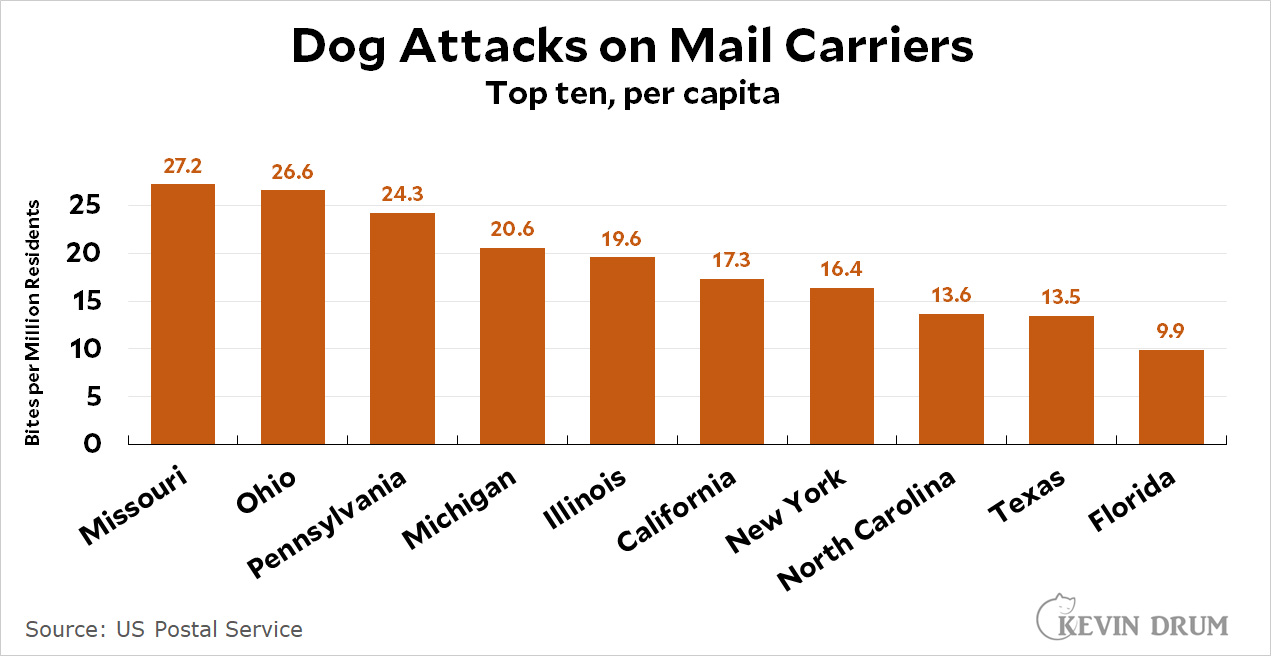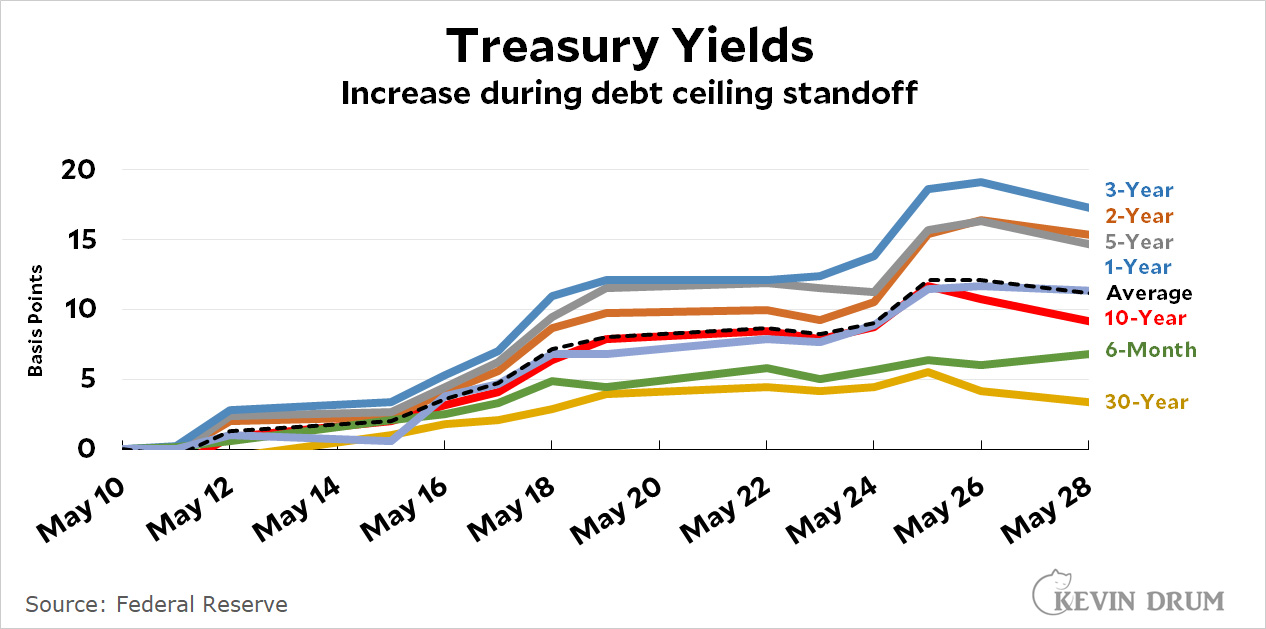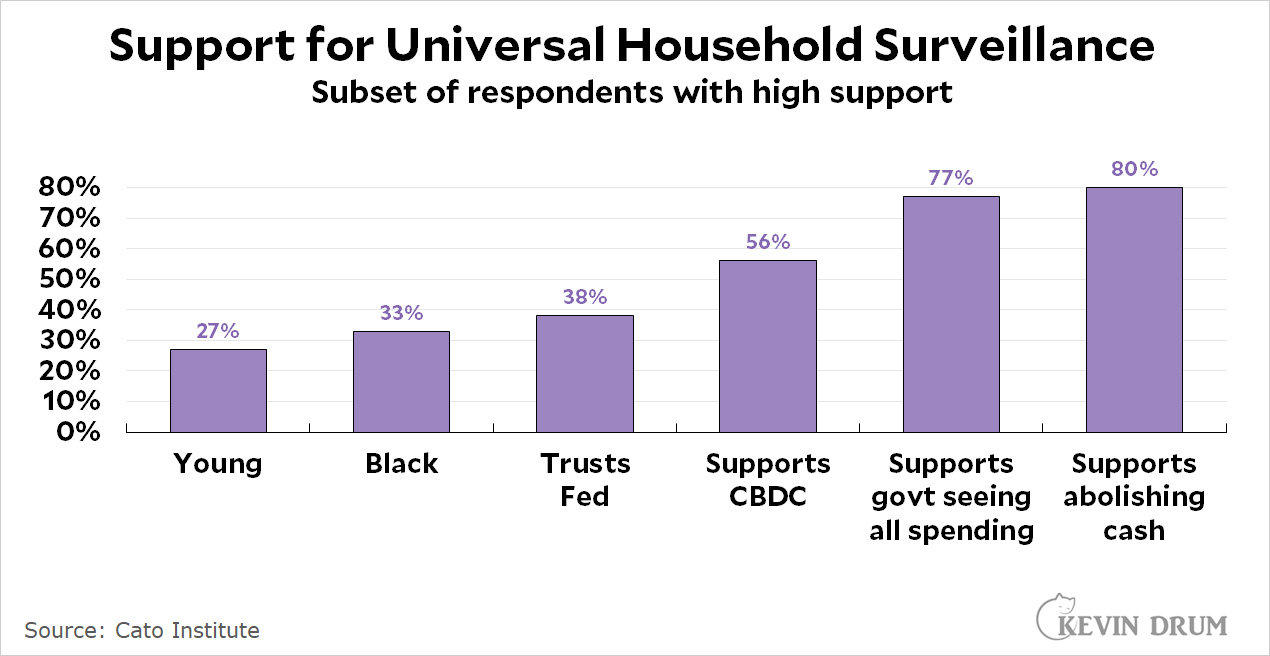A squinty-eyed squirrel in Oceanside.

Cats, charts, and politics

Bill Barr, hardly a woke lefty, says that Donald Trump is getting exactly what he deserves in the Mar-a-Lago classified documents case:
Bill Barr on the classified documents investigation:
"This is not a case of the DOJ conducting a witch hunt...This would have gone nowhere had the president just returned the documents, but he jerked them around for a year and a half...There is no excuse for what he did here." pic.twitter.com/dYWzauBqjo
— Republican Accountability (@AccountableGOP) June 6, 2023
Yep. That about covers it.
It turns out that the country behind the September 2022 bombing of the Nord Stream natural gas pipeline was almost certainly Ukraine—and US government officials have known it all along. The Washington Post reported this today based on intelligence leaks from the Discord Papers:
Details about the plan, which have not been previously reported, were collected by a European intelligence service and shared with the CIA in June 2022....The highly specific details, which include numbers of operatives and methods of attack, show that for nearly a year Western allies had a basis to suspect Kyiv in the sabotage.
....European officials in several countries have quietly suggested that Ukraine was behind the attack, but resisted publicly saying so over fears that blaming Kyiv could fracture the alliance against Russia. At gatherings of European and NATO policymakers, officials have settled into a rhythm as one senior European diplomat said recently, “Don’t talk about Nord Stream.”
The European intelligence made clear that the would-be attackers were not rogue operatives. All those involved reported directly to Gen. Valery Zaluzhny, the country’s highest-ranking military officer, who was put in charge so that Ukraine’s president, Volodymyr Zelensky, wouldn’t know about the operation, the intelligence report said.
Details of the Ukranian operation that were shared by the intelligence source are strikingly similar to evidence gathered by German law enforcement:
For instance, the Ukrainian individual that informed the European intelligence service in June said that six members of Ukraine’s special operations forces using false identities intended to rent a boat and, using a submersible vehicle, dive to the floor of the Baltic Sea then damage or destroy the pipeline and escape undetected. In addition to oxygen, the team planned to bring helium, which is recommended for especially deep dives.
German investigators now believe that six individuals using fake passports rented a sailing yacht in September, embarked from Germany and planted explosives that severed the pipelines, according to officials familiar with that investigation. They believe the operatives were skilled divers, given that the explosives were planted at a depth of about 240 feet, in the range that experts say helium would be helpful for maintaining mental focus.
Investigators...have linked Ukrainian individuals to the rental of the boat via an apparent front company in Poland. Investigators also suspect that at least one individual who serves in the Ukrainian military was involved in the sabotage operation.
Ukraine certainly makes more sense as a saboteur than either Russia, which had little reason to bomb its own pipeline, or the United States, which had already been mostly successful at persuading Germany to halt imports of Russian gas.
One interesting aspect of this is that it's yet another example of Ukraine's remarkable wartime proficiency. Just as Russia's performance in the war has been surprisingly poor, I don't think anyone expected Ukraine to be as capable and skilled on the battlefield as they have been. That the pipeline bombing, a complex and sophisticated undertaking, was conducted in secret and without a hitch, is further testimony to the Ukrainian military's fundamental competence.
The postal service announced today, as part of National Dog Bite Awareness Week, that more than 5,300 postal carriers were attacked by dogs in 2022. They list California and Texas as the top dog attack states, but of course this is only because California and Texas are the biggest states. A different story emerges if you adjust the top ten states by population:
 Missouri, it turns out, is the true dog attack capital of the US. Why? Who knows. But California is fairly average and Texas is positively low. Their dog attack reputations are wholly undeserved.
Missouri, it turns out, is the true dog attack capital of the US. Why? Who knows. But California is fairly average and Texas is positively low. Their dog attack reputations are wholly undeserved.
The ocean is basically a giant heat engine, absorbing heat from the atmosphere and recycling it via rising and sinking waters. It can absorb a vast amount of heat, but it has its limits, and eventually the surface water absorbs so much heat that it can't absorb more without itself heating up. We reached this point years ago, and this year the temperature increase in the world's oceans is more dramatic than ever:
 At the beginning of June, sea temperatures were about 0.3°C higher than ever in recent history and about 0.7°C higher than the 1982-2011 average. As a result, the extent of global sea ice is at a record low:
At the beginning of June, sea temperatures were about 0.3°C higher than ever in recent history and about 0.7°C higher than the 1982-2011 average. As a result, the extent of global sea ice is at a record low:
 A new report estimates that we will likely see an entirely ice-free Arctic summer within one or two decades. This will happen regardless of future emission scenarios.
A new report estimates that we will likely see an entirely ice-free Arctic summer within one or two decades. This will happen regardless of future emission scenarios.
There are limits to what even the sea can do to keep global temperatures stable. We outran those limits years ago and now both land and sea temperatures are rising inexorably. On land this means droughts, wildfires, crop failures, and extreme weather. On the sea it means coral destruction, the loss of Arctic ice, flooding in low-lying areas, and increased destruction from hurricanes and typhoons.
The sea may be a heat engine, but it's a sluggish heat engine. It heats up slowly, and likewise it would cool down slowly even if we stopped dumping carbon into the atmosphere tomorrow. This is one reason that climate change is such an urgent problem. Sure, land temperatures are up only about 1°C so far, but much of that is because the world's oceans have been absorbing so much excess heat. That bulwark ended years ago and the seas have long since reached their heat absorbing limit. What's more, even if we reached net zero carbon emissions immediately the sea has a tremendous amount of momentum already baked in the cake and it will take decades for sea temperatures to stop rising and finally begin to moderate. This is why we have so little time to lose.
One of the (many) downsides of the debt ceiling debacle is the possibility that it undermined faith in US treasury bonds. If that happened, interest rates on treasuries would increase, potentially costing the government billions in higher funding rates.
So did this happen? A very rough back-of-the-envelope look at treasury yields suggests it did—a little bit, anyway:
 Starting in early May, when concerns peaked that no agreement would be reached before a government default, yields increased by about 10-15 basis points (0.1%-0.15%). There's no sure way to know if this was caused by debt ceiling worries, but the timing is consistent.
Starting in early May, when concerns peaked that no agreement would be reached before a government default, yields increased by about 10-15 basis points (0.1%-0.15%). There's no sure way to know if this was caused by debt ceiling worries, but the timing is consistent.
How much did this cost us? Probably not much. A 2011 report by the General Accounting Office estimated that that year's debt ceiling crisis raised yields by about 25 basis points and cost the government $1.3 billion. If the dynamic is similar this time around, the cost of this year's debt ceiling crisis cost about half a billion dollars—possibly a few times that amount over the course of the next few years.
That's not much. The early resolution of the crisis probably helped us dodge this particular bullet.
Over the past year three huge crypto firms have failed: Genesis, FTX, and Three Arrows. At least two of them came to ruin because they were fundamentally corrupt and misused customer funds.
But none of these three is the biggest crypto firm. Binance is. A few months ago I noted this and asked, "When Binance cracks up I wonder what we'll think then?"
Well, the other shoe dropped today in a landmark SEC lawsuit against Binance and its founder, Changpeng Zhao:
The SEC said that Binance and Zhao misused customers’ funds and diverted them to a trading entity that Zhao controlled. That trading firm, Sigma Chain, engaged in manipulative trading that made Binance’s volume appear larger than it actually was, the SEC said.
Binance also concealed that it commingled billions of dollars in customer assets and sent them to a third-party, Merit Peak, which was owned by Zhao, the SEC alleged.
Even if you think that crypto is inherently a scam, as I do, it's not the case that crypto trading has to be a scam. You can be a true believer and run an honest platform that allows people to buy and sell products that I happen to think are worthless.
And yet crypto seems to attract Ponzi-like corruption the way shit attracts flies. The problem, I assume, is that an honest crypto platform isn't very profitable. You can make some money, but worthless products just don't generate large fees or commissions. To make serious money, you need to convince people that crypto isn't just real, but an unstoppable juggernaut that only the select few truly understand. And the only way to do that is by running a corrupt platform that's designed to look much bigger and richer than it really is. Reality on its own is just too drab to keep the marks on the hook.
This is the damnedest thing I've seen in a long time. The Cato Institute recently commissioned a YouGov survey about support for a Central Bank Digital Currency. For what it's worth, only 16% support it, but that's of minimal interest. Cato also asked a few other questions, and for some reason one of them was about household surveillance:
"Would you favor or oppose the government installing surveillance cameras in every household to reduce domestic violence, abuse, and other illegal activity?"
(Emphasis mine.) It turns out that 14% of Americans are in favor of putting cameras in every single home and monitoring them for illegal activity. This is mind boggling. What's even more mind boggling is that support for household cameras is considerably higher among some groups:
 A full 27% of young people (age 18-34) support universal surveillance. A third of Black people (and a quarter of Latinos) support it. Among people who like the idea of the government being able to monitor all financial transactions, 77% support it.
A full 27% of young people (age 18-34) support universal surveillance. A third of Black people (and a quarter of Latinos) support it. Among people who like the idea of the government being able to monitor all financial transactions, 77% support it.
I'm so taken aback by this that I'm not sure what to say about it. It's not figuratively Big Brother, it's literally Big Brother. And it's not cameras in public places. The question is crystal clear that it's about cameras inside every house in the country. How is it possible that so many people think this is a great idea? Am I missing something here?